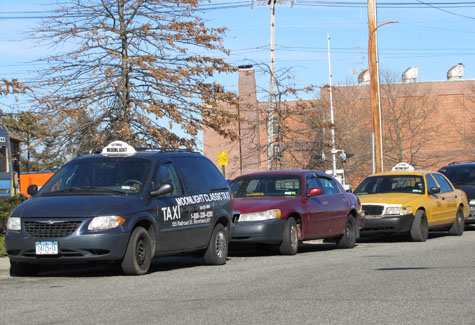Cabbie ‘investigation’ renews call for drug testing

The Riverhead Town Board is considering a proposal to regulate all taxis picking up or dropping off fares in the town, and one of the provisions being considered would require random drug testing of anyone operating a cab within town limits.
Riverhead is one of only a few Long Island towns that do not have regulations on the books regarding taxicabs, according to deputy town attorney William Duffy, who drafted the proposed law that was discussed during Thursday’s public Town Board work session.
“There’s an investigation being done right now to see if some of the taxicabs are being used for things they shouldn’t be used for,” Supervisor Sean Walter said while declining to speak to specifics of the investigation. “Normally we are not a board that wants to sit there and overregulate people. But given the investigation that is going on, I don’t feel this is an overregulation. I feel it is well warranted.”
In 2010, in the Flanders and Riverside sections of neighboring Southampton Town, there were two separate incidents where cab drivers were arrested for driving while under the influence of drugs. In one of those cases, a cabbie who was found in possession of a crack pipe, and had admitted to smoking crack, was involved in a three-car crash, police said at the time.
Mr. Duffy said the proposed law would regulate taxicab business owners by requiring them to get town-issued licenses. The drivers and the cabs themselves would also all have to be licensed. He said some towns have laws that give the town clerk discretion in issuing such licenses, but the draft he has drawn up for Riverhead is more ministerial.
“For me, the endgame is to make sure that those operating within the town, or at least wholly within the Town of Riverhead, must have vehicles that are safe, and drivers that are safe,” said Councilman Jim Wooten, who said he used to drive a cab.
The draft proposal submitted by Mr. Duffy also calls for fingerprinting of all applicants, and would require that an application for cab driver’s permit be rejected if the applicant has been convicted of a felony within the past 10 years, or convicted of a crime involving the manufacture, transportation, possession or sale of illegal drugs, as defined by state law.
Applications also must be rejected for conviction of a crime involving the operation of a motor vehicle under the influence of alcohol or drugs, or any offense that requires the applicant to register as a sex offender, according to the draft law.
Convictions for reckless driving or endangering the welfare of a child also would require an automatic rejection, under the proposal.
Town officials said they supported requiring random drug tests for cab drivers, but didn’t want the town to do the testing. Instead, they said, cab companies would have to show the town proof that their drivers passed drug tests.
Under the plan, cab companies also would have to show the town proof that their cabs pass inspection for safety requirements. None of the area’s major cab companies returned calls seeking comment.
Mr. Walter noted the town is not interested in regulating things like cab fares or advertisements on the cabs.
Mr. Duffy said other towns’ ordinances limit their jurisdiction to vehicles operating wholly within the town.
Therefore, a cab picking up someone in that town and delivering that person outside the town, or a cab picking up someone outside the town and dropping them off inside the town, or a cab driving through the town, are all exempt from the provisions of the ordinance. The local laws are drawn up that way, he said, because state law limits municipalities in the regulation of taxicabs to just vehicles for hire “wholly within such a municipality.”
The board has been considering such an ordinance for at least five years but has yet to adopt one.
Mr. Walter said a prior draft of a cab ordinance was considered to be “too onerous.”
Officials have yet to set a public hearing on the current proposal.








